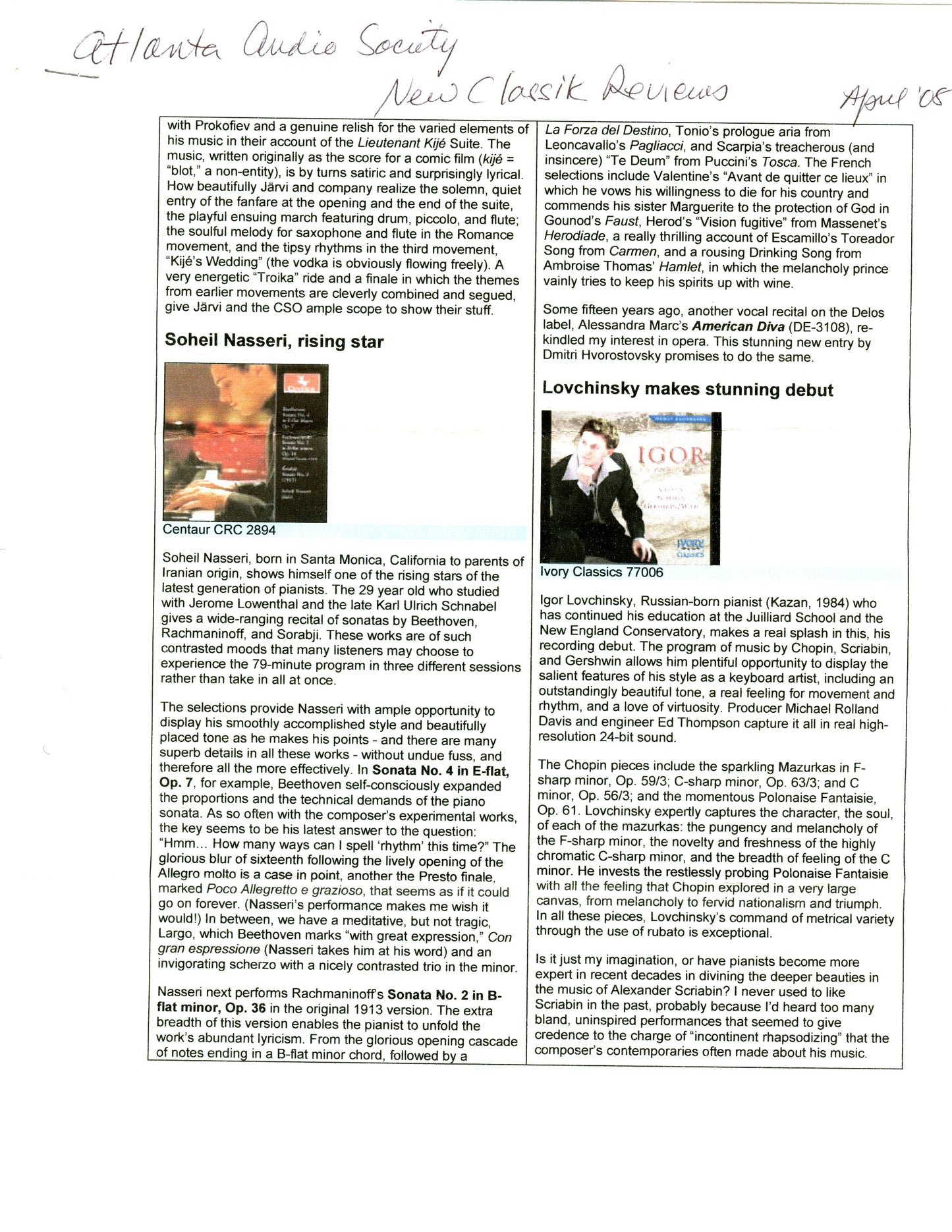1
/
of
22
Pianist Igor Lovchinsky: Debut Recording (CDR available only)
Pianist Igor Lovchinsky: Debut Recording (CDR available only)
Regular price
¥1,600 JPY
Regular price
Sale price
¥1,600 JPY
Unit price
/
per
Couldn't load pickup availability
Ivory Classics CD-77006
IGOR Lovchinsky: Debut Recording
Frederic Chopin (1810-1849):
01. Mazurka in F Sharp Minor Op. 59, No. 303:02 ('07)
02. Mazurka in C Sharp Minor, Op. 63, No. 302:03 ('07)
03. Mazurka in C Minor Op. 56, No. 305:18 ('07)
04. Polonaise Fantaisie in A Flat Major, Op. 6111:20 ('07)
IGOR Lovchinsky: Debut Recording
Frederic Chopin (1810-1849):
01. Mazurka in F Sharp Minor Op. 59, No. 303:02 ('07)
02. Mazurka in C Sharp Minor, Op. 63, No. 302:03 ('07)
03. Mazurka in C Minor Op. 56, No. 305:18 ('07)
04. Polonaise Fantaisie in A Flat Major, Op. 6111:20 ('07)
Alexander Scriabin (1872-1915):
Sonata No. 2 'Sonata-Fantasy' in G-Sharp Minor, Op. 19
05. 1st Mvt.: Andante06:38 ('07)
06. 2nd Mvt.: Presto03:44 ('07)
07. Sonata No. 9 'Black Mass', Op. 6807:30 ('07)
08. Sonata No. 5 'Poem of Ecstasy', Op. 5310:23 ('07)
George Gershwin / Earl Wild
Seven Virtuoso Etudes (1976)
09. No.5: Oh, Lady Be Good03:05 ('07)
10. No.3: The Man I Love02:24 ('07)
11. No.7: Fascinatin' Rhythm01:30 ('07)
12. No.2: Somebody Loves Me02:36 ('07)
13. No.1: Liza03:02 ('07)
14. No.4: Embraceable You02:40 ('07)
15. No.6: I Got Rhythm02:02 ('07)
Piano: Igor Lovchinsky
Producer: Michael Rolland Davis
Engineer: Ed Thompson
Recorded at Holy Trinity Lutheran Church, Buffalo, N.Y. June 6-7, 2007
Original 24/88.2 Master - Recorded direct to the SADiE Artemis
24-Bit High Resolution digital workstation.
Piano: Shigeru Kawai EX Concert Grand #2425001
Shigeru Kawai Master Piano Artisan: Takanori Otake
Special thanks to: Rev. Dr. Charles D. Bang of the Holy Trinity Lutheran Church, Buffalo, N.Y. and Brian Chung, Senior Vice President of Shigeru Kawai Piano Company
This recording was made possible through the support of The Ivory Classics Foundation and Mr. Jason Subotky
Liner Notes: James E. Frazier
Design: Samskara, Inc.
Acclaimed by the Polish Daily News for his "mesmerizing and fiery" performances and hailed by the Southampton Press for his "profoundly communicative" and "wonderfully poignant" music-making, pianist Igor Lovchinsky has performed at the Kennedy Center, Carnegie Hall's Weill Recital Auditorium, the Bushnell Center, the Eastman Theater and the Ohio Theater. Internationally, he has presented recitals at the Chopin Memorial at Lazienki Park in Warsaw, Poland, the Embassy of the United States in Beijing, China and the Rosza Centre in Calgary, Canada.
Disc.Reviews
Twenty-four-year-old Igor Lovchinsky's impressive debut recording is chock-full of an elder statesman's virtuosity. That alone merits high praise. But the candelabra on this baby grand, if you will, is the insightful, wise sequencing. Programming late Chopin to segue into disciple Alexander Scriabin—the inevitable evolution from a late-period, experimental Romanticism to the farthest reaches of the cosmos—goes beyond the typical thinking that too frequently fills recital halls and compact discs.
From Scriabin, the transition to Earl Wild's Gershwin transcriptions is a precocious stroke of genius. These "Seven Virtuoso Etudes," maniacal distortions of swingin' tunes like "I Got Rhythm" and "Fascinatin' Rhythm," show the far-flung similarities between Tin Pan Alley and the virtuosic spaces conceived in the Moscow composer's mystical mind.
Lovchinsky's knuckle-busting feels purposeful and meditative, the brand of a modest but limitlessly talented musician. That's particularly true in Scriabin's two-movement Sonata No. 2 (Sonata-Fantasy). The first romantic segment anticipates the liquid pianism Ravel would cultivate for the piano a decade or so later. Lovchinsky evenly cascades the falling 32nd notes with as steady a hand as a Walter Gieseking or Martha Argerich. In Sonatas 5 and 9, Scriabin's interplanetary sound worlds come sensuously alive.
The Kazan, Russia, native's refreshing batch of Chopin includes some admirably spun Mazurkas and the Polonaise-Fantasy, Op. 61, the latter a work in the Pole's canon that's much harder to interpret convincingly. The Juilliard grad opts for brisker tempi and avoids luxuriating or pondering its numerous fermatas for too long. His no-nonsense approach injects the work with a stimulating, unsentimental flavor, which has us already salivating for a sophomore project.
Bryant Manning, , Jan. 2009
Igor Lovchinsky, Russian-born pianist (Kazan, 1984) who has continued his education at the Juilliard School and the New England Conservatory, makes a real splash in this, his recording debut. The program of music by Chopin, Scriabin, and Gershwin allows him plentiful opportunity to display the salient features of his style as a keyboard artist, including an outstandingly beautiful tone, a real feeling for movement and rhythm, and a love of virtuosity. Producer Michael Rolland Davis and engineer Ed Thompson capture it all in real high-resolution 24-bit sound.
The Chopin pieces include the sparkling Mazurkas in F-sharp minor, Op. 59/3; C-sharp minor, Op. 63/3; and C minor, Op. 56/3; and the momentous Polonaise Fantaisie, Op. 61. Lovchinsky expertly captures the character, the soul, of each of the mazurkas: the pungency and melancholy of the F-sharp minor, the novelty and freshness of the highly chromatic C-sharp minor, and the breadth of feeling of the C minor. He invests the restlessly probing Polonaise Fantaisie with all the feeling that Chopin explored in a very large canvas, from melancholy to fervid nationalism and triumph. In all these pieces, Lovchinsky's command of metrical variety through the use of rubato is exceptional.
Is it just my imagination, or have pianists become more expert in recent decades in divining the deeper beauties in the music of Alexander Scriabin? I never used to like Scriabin in the past, probably because I'd heard too many bland, uninspired performances that seemed to give credence to the charge of "incontinent rhapsodizing" that the composer's contemporaries often made about his music. Lovchinsky's accounts of Sonatas Nos. 2 ("Sonata-Fantasy"), 9 ("Black Mass"), and 5 ("Poem of Ecstasy") on the other hand, are filled with the qualities that bring this music vividly to life, especially a grasp of the harmonic structure underlying Scriabin's incandescent chromaticism, without which no pianist can hope to bring about the real feeling of climax and release in this music.
The final third of the program is playtime for Lovchinsky, as he relishes the smart rhythms, syncopations, and both "blue" and ebullient moods in Earl Wild's Seven Virtuoso Etudes on melodies by George Gershwin. These include "Oh, Lady Be Good," "The Man I Love," "Fascinatin' Rhythm," "Somebody Loves Me," "Liza," "Embraceable You," and "I Got Rhythm." Colorful, complex, and abounding in interesting musical ideas, these etudes make for a perfect end to a program that you will want to encore early and often.
Muse Inc., Mar. 2008












































